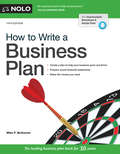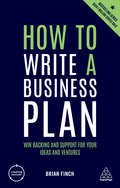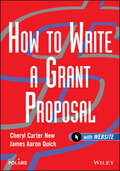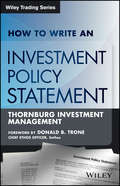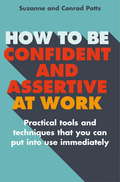- Table View
- List View
How to Write a Business Plan
by Edwin T. Crego Jr.The key to a professional-quality business plan. This best-selling book has been updated to include crucial information on diagnosing and measuring customer satisfaction. How to Write a Business Plan, Fourth Edition not only puts all the facts and planning formats you need right at your fingertips, but also gives you the latest thinking on effective business planning. It shows you how to organize and implement the planning process from beginning to end and translate your plan into action You will learn how to: * Evaluate your company's capabilities, strengths, and weaknesses * Pinpoint the crucial elements of your competitive environment, including market, economic, and technological factors * Set realistic production/service, revenue, and overall operating goals and objectives * Develop and coordinate strategies that strengthen your company's production, marketing, research and development, organization and management, and financial systems * Identify and integrate customer requirements into your plan * Write the actual planning document and implement it to guide your company to greater productivity and profits * Implement your plan successfully * Obtain the capital you need to grow
How to Write a Business Plan
by Mike P. McKeeverStep-by-step advice on preparing a business plan You need a sound business plan to start a business or raise money to expand an existing one. For over 30 years, How to Write a Business Plan has helped fledgling entrepreneurs—from small service businesses and retailers to large manufacturing firms—write winning plans and get needed financing. This bestselling book contains clear step-by-step instructions and forms to put together a convincing business plan with realistic financial projections, effective marketing strategies, and overall business goals. You’ll learn how to: figure out if your business idea will make money determine and forecast cash flow create profit and loss forecasts prepare marketing and personnel plans find potential sources of financing, and present your well-organized plan to lenders and other backers. This edition is updated to reflect best practices for raising money (from SBA loans to equity crowdfunding).
How to Write a Business Plan (9th edition)
by Mike MckeeverThis thorough guide describes the elements of a small business plan, shows how to apply financial and business planning techniques, and suggests financing sources for starting a new business. The seventh edition updates the list of resources in the last chapter. Annotation ©2004 Book News, Inc., Portland, OR (booknews.com)
How to Write a Business Plan: Win Backing and Support for Your Ideas and Ventures (Creating Success #1)
by Brian FinchIf you are starting or selling your own business, or wanting to expand your company, business plans are essential. Get expert guidance on how to make an impact with your business plan and successfully communicate your strategic vision.Whether it is to raise finance, sell a business or develop a specific project, this is your one-stop guide to producing the most professional and convincing business plan for a new venture. This 7th edition now features even more practical exercises, useful templates and top tips to help you write a comprehensive and compelling plan, as well as content on digital developments such as crowdfunding, online retailing and digital marketing.The Creating Success series of books...Unlock vital skills, power up your performance and get ahead with the bestselling Creating Success series. Written by experts for new and aspiring managers and leaders, this million-selling collection of accessible and empowering guides will get you up to speed in no time. Packed with clever thinking, smart advice and the kind of winning techniques that really get results, you'll make fast progress, quickly reach your goals and create lasting success in your career.
How to Write a Business Plan: Win Backing and Support for Your Ideas and Ventures (Creating Success #69)
by Brian FinchWhether you are starting or selling your own business, business plans are an essential part of the process. How to Write a Business Plan gives you the expert guidance you need to make an impact with your plan, including advice on researching competitors, presenting your management skills and successfully communicating your strategic vision. Whether it is to raise finance, sell a business or develop a specific project, this is your one-stop guide to producing the most professional and convincing business plan for a new venture.Fully updated for 2019, this 6th edition now features even more practical exercises, useful templates, and top tips to help you write a comprehensive and compelling plan, as well as content on digital developments such as crowdfunding, online retailing and digital marketing. The Creating Success series of books...Unlock vital skills, power up your performance and get ahead with the bestselling Creating Success series. Written by experts for new and aspiring managers and leaders, this million-selling collection of accessible and empowering guides will get you up to speed in no time. Packed with clever thinking, smart advice and the kind of winning techniques that really get results, you'll make fast progress, quickly reach your goals and create lasting success in your career.
How to Write a Business Plan: Win Backing and Support for Your Ideas and Ventures (Creating Success)
by Brian FinchIf you are starting or selling your own business, or wanting to expand your company, business plans are essential. Get expert guidance on how to make an impact with your business plan and successfully communicate your strategic vision.Whether it is to raise finance, sell a business or develop a specific project, this is your one-stop guide to producing the most professional and convincing business plan for a new venture. This 8th edition now features even more practical exercises, useful templates and top tips to help you write a comprehensive and compelling plan, as well as content on digital developments such as crowdfunding, online retailing and digital marketing.The Creating Success series of books...Unlock vital skills, power up your performance and get ahead with the bestselling Creating Success series. Written by experts for new and aspiring managers and leaders, this million-selling collection of accessible and empowering guides will get you up to speed in no time. Packed with clever thinking, smart advice and the kind of winning techniques that really get results, you'll make fast progress, quickly reach your goals and create lasting success in your career.
How to Write a Case-Based Essay
by William ElletWriting about a case is very different from talking about it. This chapter describes how to organize and write a logical, economical, and convincing case essay.
How to Write a Financial Report: Communicating Critical Financial Signs From the Numbers
by Tage C. TracyComplete guide to understanding and writing financial reports with clear communication Accompanying the hugely successful How to Read a Financial Report, How to Write a Financial Report is your non-specialist and jargon-simplified guide to the art of writing a financial report and effectively communicating critical financial information and operating results to your target audience. This book also covers utilizing different KPIs and types of reports and statements to convey a cohesive quantitative story to everyone reading your report, even if they aren't experts in accounting and finance. This book pays special attention to the “big three” financial statements, the differences between internal and external financial information/reports, and confidentiality factors, disclosure levels, and risk elements when deciding which information to include. This book also discusses important elements in financial reports, including: Providing an expanded understanding of the big three financial statements and how these act as the base food which feeds the financial reporting beast. Producing financial reports that keep the audience engaged, focused, and educated. Learning how to speak the base language of accounting and finance. Diving deeper into financial stability and operating results by using ratios, trends, and variance analyzes to improve financial reporting. Offering examples of real financial reports for hands on reference and use in the real world. With everything readers need to write, analyze, and communicate financial accounting reports, How to Write a Financial Report earns a well-deserved spot on the bookshelves of investors, lenders, business leaders, analysts, and managers seeking to improve their writing and comprehension skills, along with investors seeking to better understand where financial information comes from and how it is presented.
How to Write a Grant Proposal (Wiley Nonprofit Law, Finance And Management Ser.)
by James Aaron Quick Cheryl Carter NewStep-by-step guidance on how to write effective grants that get the funding you need. Complete with examples of fully-completed proposals, you'll also get an easy-to-use companion website containing guide sheets and templates that can be easily downloaded, customized, and printed. The authors provide examples of completed proposals and numerous case studies to demonstrate how the grant-seeking process typically works. Order your copy today!
How to Write a Great Business Plan (HBR Bestseller)
by William A. SahlmanEvery seasoned investor knows that detailed financial projections for a new company are an act of imagination. Nevertheless, most business plans pour far too much ink on the numbers--and far too little on the information that really matters. Why? William Sahlman suggests that a great business plan is one that focuses on a series of questions. These questions relate to the four factors critical to the success of every new venture: the people, the opportunity, the context, and the possibilities for both risk and reward. A great business plan is not easy to compose, Sahlman acknowledges, largely because most entrepreneurs are wild-eyed optimists. But one that asks the right questions is a powerful tool. A better deal, not to mention a better shot at success, awaits entrepreneurs who use it.
How to Write a Great Business Plan (Harvard Business Review Classics)
by William A. SahlmanJudging by all the hoopla surrounding business plans, you'd think the only things standing between would-be entrepreneurs and spectacular success are glossy five-color charts, bundles of meticulous-looking spreadsheets, and decades of month-by-month financial projections. Yet nothing could be further from the truth. In fact, often the more elaborately crafted a business plan, the more likely the venture is to flop. Why? Most plans waste too much ink on numbers and devote too little to information that really matters to investors. The result? Investors discount them. In How to Write a Great Business Plan, William A. Sahlman shows how to avoid this all-too-common mistake by ensuring that your plan assesses the factors critical to every new venture: · The people--the individuals launching and leading the venture and outside parties providing key services or important resources · The opportunity--what the business will sell and to whom, and whether the venture can grow and how fast · The context--the regulatory environment, interest rates, demographic trends, and other forces shaping the venture's fate · Risk and reward--what can go wrong and right, and how the entrepreneurial team will respond Timely in this age of innovation, How to Write a Great Business Plan helps you give your new venture the best possible chances for success.
How to Write a Marketing Plan
by John WestwoodHow to Write a Marketing Plan, 4th edition, simplifies the task of developing a marketing plan for a product or business. Taking a step-by-step approach to the entire process, from carrying out a marketing audit, setting objectives and devising budgets, to writing and presenting the plan and finally, implementation. With a brand new chapter to help you produce mini-plans and seize new opportunities quickly, it is essential reading for anyone who wants to boost their business, sell products or services and learn the techniques of market research.
How to Write a Marketing Plan
by John WestwoodHow to Write a Marketing Plan provides a step-by-step guide to creating a successful marketing plan: from carrying out a marketing audit, setting objectives and devising budgets to writing, presenting and implementing the plan. With brand new content on producing mini-plans and seizing new opportunities quickly, it also contains the most current information on email marketing, web usage, mobile commerce and social media. Including helpful chapter summaries and a detailed sample marketing plan, How to Write a Marketing Plan is essential reading for anyone who wants to boost their product or business. The creating success series of books...With over one million copies sold, the hugely popular Creating Success series covers a wide variety of topics and is written by an expert team of internationally best-selling authors and business experts. This indispensable business skills collection is packed with new features, practical content and inspiring guidance for readers across all stages of their careers.
How to Write a Marketing Plan: Define Your Strategy, Plan Effectively and Reach Your Marketing Goals (Creating Success #4)
by John WestwoodA step-by-step guide to creating a successful marketing plan: from carrying out a marketing audit, setting objectives and devising budgets to writing, presenting and implementing the plan.How to Write a Marketing Plan includes advice on producing mini-plans and the most current information on email marketing, web usage, mobile commerce and social media. This 7th edition now features even more practical exercises, useful templates, and top tips to help you develop this all-important business skill. Including helpful chapter summaries and a detailed sample marketing plan, it is essential reading for anyone who wants to boost their product or business.The Creating Success series of books...Unlock vital skills, power up your performance and get ahead with the bestselling Creating Success series. Written by experts for new and aspiring managers and leaders, this million-selling collection of accessible and empowering guides will get you up to speed in no time. Packed with clever thinking, smart advice and the kind of winning techniques that really get results, you'll make fast progress, quickly reach your goals and create lasting success in your career.
How to Write a Marketing Plan: Define Your Strategy, Plan Effectively and Reach Your Marketing Goals (Creating Success)
by John WestwoodHow to Write a Marketing Plan provides a step-by-step guide to creating a successful marketing plan: from carrying out a marketing audit, setting objectives and devising budgets to writing, presenting and implementing the plan. With content on producing mini-plans and seizing new opportunities quickly, it also contains the most current information on email marketing, web usage, mobile commerce and social media. Fully updated for 2019, this 6th edition now features even more practical exercises, useful templates, and top tips to help you develop this all-important business skill. Including helpful chapter summaries and a detailed sample marketing plan, How to Write a Marketing Plan is essential reading for anyone who wants to boost their product or business.The Creating Success series of books...Unlock vital skills, power up your performance and get ahead with the bestselling Creating Success series. Written by experts for new and aspiring managers and leaders, this million-selling collection of accessible and empowering guides will get you up to speed in no time. Packed with clever thinking, smart advice and the kind of winning techniques that really get results, you'll make fast progress, quickly reach your goals and create lasting success in your career.
How to Write a Marketing Plan: Define Your Strategy, Plan Effectively and Reach Your Marketing Goals (Creating Success)
by John WestwoodA step-by-step guide to creating a successful marketing plan: from carrying out a marketing audit, setting objectives and devising budgets to writing, presenting and implementing the plan.How to Write a Marketing Plan includes advice on producing mini-plans and the most current information on email marketing, web usage, mobile commerce and social media. This 8th edition now features even more practical exercises, useful templates, and top tips to help you develop this all-important business skill. Including helpful chapter summaries and a detailed sample marketing plan, it is essential reading for anyone who wants to boost their product or business.The Creating Success series of books...Unlock vital skills, power up your performance and get ahead with the bestselling Creating Success series. Written by experts for new and aspiring managers and leaders, this million-selling collection of accessible and empowering guides will get you up to speed in no time. Packed with clever thinking, smart advice and the kind of winning techniques that really get results, you'll make fast progress, quickly reach your goals and create lasting success in your career.
How to Write a Resume and Get a Job
by Luis CortesHow To Write A Résumé And Get A Job Finding a job can be nerve-racking. It's hard to know even where to begin: Where are jobs listed? What skills do you need? How can you make your résumé stand out? A job hunt involves many unspoken rules that can't be broken, and it's easy to unknowingly hurt your chances. In How to Write a Résumé and Get a Job, the Reverend Luis Cortés Jr. supplies you with the necessary information for securing a promising job. He will lead you through every step, from searching and applying to negotiating for a better salary, asking for benefits, and enjoying your success. A job isn't everything, but it is your key to a better future. Following Cortés's guidance ensures that your search will be a successful one.
How to Write a Statement of Work
by Michael G. Martin PMP Peter S. Cole CPCMThe standard on government statements of work just got better!How to Write a Statement of Work has been a standard reference for government employees and contractors for many years. Now, with this sixth edition, it is even more relevant and useful. Based on the excellent foundation laid by the late Peter Cole, Michael Martin has updated and added material to guarantee this handbook's place in the list of "must haves" for working with government contracts. As in the earlier editions, the emphasis is on providing practical, detailed guidance on writing and preparing a description of government requirements, whether a statement of work (SOW), a performance work statement (PWS), or a statement of objectives (SOO).Among the many additions to this sixth edition are updates to reflect the current definition of an SOO as well as references and guidance regarding the development and application of the SOO. There is a new chapter on why change management is so important on projects, legal precedents supporting change management, and how to identify when a change occurs using the SOW. This new chapter also includes information on the federal government's Standard Form 30 (SF30) to provide perspective on how change orders are used and applied in the federal government. If you are working in government contracting in any capacity, you should have this book on hand!
How to Write a Stellar Executive Resume: 50 Tips to Reaching Your Job Target
by Brenda BernsteinHow to Write a Stellar Executive Resume is a step-by-step guide that empowers readers to create an effective and stand out from the crowd as a top candidate for an executive position. Brenda Bernstein, a Certified Executive Resume Master and author of the #1 Bestseller How to Write a Killer LinkedIn Profile, shares the tips and tricks she’s learned from more than two decades of helping job seekers get connected with the right position. Readers will discover: • The importance of knowing the target audience and how to best connect with them • Key social media tips for spreading the word about their skills and experiences • Why good ol’ cover letters are important, and how to use them effectively • Power verbs to use, and words to avoid • Samples of successful resumes For many executives conducting a job search, it may have been quite a while since they were last “looking.” It’s easier than ever to apply for a job – and as a result, there’s a lot of competition for a limited number of openings. There’s a lot to learn about the recruiting world we live in, and the best ways to use the tools at our disposal. This book provides practical, proven, up-to-date best practices for creating an effective executive resume that gets results.
How to Write an Impressive CV and Cover Letter: A Comprehensive Guide for Jobseekers
by Tracey WhitmoreYour CV, cover letter and LinkedIn profile are your first communication with a prospective employer. As the job market is more competitive than ever, grabbing an employer's attention and making the right first impression has never been more important. If you compromise on the quality of your CV, cover letter and LinkedIn profile, you reduce your chances of winning an interview.This book, which will appeal to anyone from entry level to board level, is a step-by-step guide on how to approach job hunting and achieve a killer competitive advantage by producing an impressive CV, cover letter and LinkedIn profile. Invaluable views and advice from senior HR and industry professionals, who are often the first point of entry, are provided throughout the book.How to Write an Impressive CV and Cover Letter will support jobseekers through the entire job-hunting process. It offers access to practical, real-life examples of CVs and cover letters that have secured interviews and helped individuals win their dream job. Readers will gain access to these documents, together with valuable templates, as part of the book.
How to Write an Impressive CV and Cover Letter: A Comprehensive Guide for Jobseekers
by Tracey WhitmoreYour CV, cover letter and LinkedIn profile are your first communication with a prospective employer. As the job market is more competitive than ever, grabbing an employer's attention and making the right first impression has never been more important. If you compromise on the quality of your CV, cover letter and LinkedIn profile, you reduce your chances of winning an interview.This book, which will appeal to anyone from entry level to board level, is a step-by-step guide on how to approach job hunting and achieve a killer competitive advantage by producing an impressive CV, cover letter and LinkedIn profile. Invaluable views and advice from senior HR and industry professionals, who are often the first point of entry, are provided throughout the book.How to Write an Impressive CV and Cover Letter will support jobseekers through the entire job-hunting process. It offers access to practical, real-life examples of CVs and cover letters that have secured interviews and helped individuals win their dream job. Readers will gain access to these documents, together with valuable templates, as part of the book.
How to Write an Inspired Creative Brief
by Howard IbachThis book is very much useful for educators and students who are interested in marketing, advertising or public relations and also for those engaged in selling, marketing a product or service.
How to Write an Investment Policy Statement
by Rocco DibrunoAn indispensable resource for every financial service professionals developing an IPS The Investment Policy Statement (IPS) is one of the most critical documents fiduciaries must draft. For years, ERISA and other industry regulations have governed the guidelines all fiduciaries must comply with when drafting one. But the current climate of corporate scandal and the 2008 global banking crisis have led to increased scrutiny by regulators, prompting firms to take a closer look at the quality and integrity of their IPSs and to take steps to have a rigorous formal process in place for drafting them. Endorsed by the Foundation of Fiduciary Studies, this concise guide provides a rigorous framework and the expert insight, information and guidance you need to guarantee that your IPS is in complete compliance with all ERISA-directed requirements.Provides a step-by-step plan for creating a uniform IPS that every advisor in the office can followDefines the duties and responsibilities of all parties involved, while clarifying diversification guidelines and providing methods for keeping costs under controlPacked with ready-to-use templates, sample forms, letters and other documents, diagrams and other valuable tools, including sample Policy Statement downloadable at the companion websiteDesigned to get you quickly up to speed on what you need to know to confidently serve your clients with the highest standards of care and protection
How to be Confident and Assertive at Work: Practical tools and techniques that you can put into use immediately
by Suzanne Potts Conrad PottsThis book will restore your confidence and help you to be more assertive and command more respect at work. It will enable you to:- Be valued for who you are- Ask for what you are entitled to- Say 'no' when you have the right to do so- Have your opinions and ideas heard and respected- Stand up for yourself- Handle difficult situations calmly and successfullyIt also provides a step-by-step guide to how to deal with some of the most common situations that you are likely to face during your working life - including asking for a pay rise!¬
How to be Confident and Assertive at Work: Practical tools and techniques that you can put into use immediately
by Suzanne Potts Conrad PottsThis book will restore your confidence and help you to be more assertive and command more respect at work. It will enable you to:- Be valued for who you are- Ask for what you are entitled to- Say 'no' when you have the right to do so- Have your opinions and ideas heard and respected- Stand up for yourself- Handle difficult situations calmly and successfullyIt also provides a step-by-step guide to how to deal with some of the most common situations that you are likely to face during your working life - including asking for a pay rise!¬

